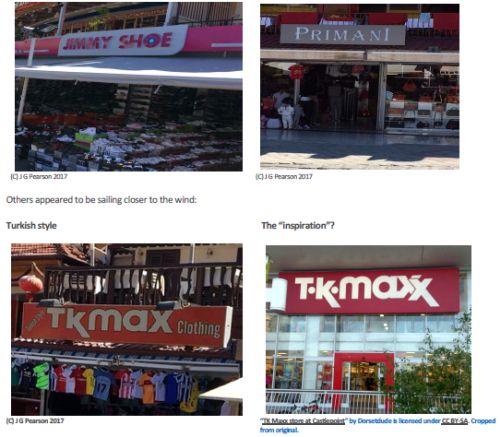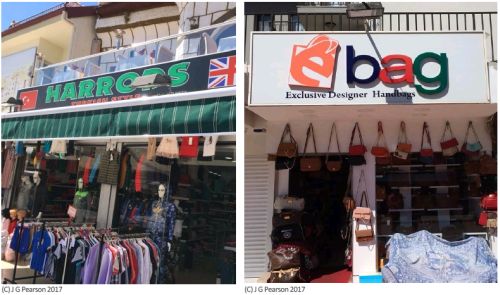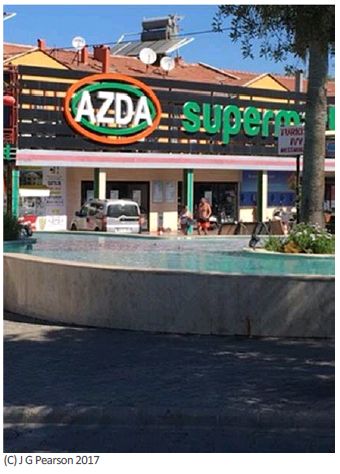Jim Pearson spent a week in Turkey recently and couldn't resist taking some photos of the local shop signs. Some were, in his opinion, playful – possibly harmless – takes on some well-known brands:


I'm pretty certain that none of the Turkish shops I saw are sanctioned by the brand owner that might spring to mind when you see the shop signs in question. Do the brand owners care? Perhaps the damage being caused is so low as not to be noticed, or if noticed considered not to be worth pursuing. The average sophisticated consumer from the UK sees such shops and is under no illusion that the use of the brand is not sanctioned. The goods being sold are sometimes only tenuously linked to the brand being parodied/copied:

Who'd expect eBay to be selling bags from a high street in Turkey after all? Just like the branch of Singhsbury's being operated by Jel Singh Nagra in North Tyneside until recently, we all surely know that the shop is not operated, nor sanctioned, by the true brand owner. Is such use truly riding on the coat-tails of the reputation enjoyed by the brand owner when the brand is sufficiently well-known that everyone realises what is going on? In the UK, Sainsbury's were sufficiently bemused to take action against Mr Nagra, whereas Morrisons were content to allow him to rebrand to Morrisinghs. Perhaps the marketing / PR department of Morrisons has greater influence than their legal department? What is the real damage to Morrison's though? Will there be diversion of trade, brand dilution or any real advantage to Mr Nagra?
My instincts tell me that the damage caused by these "entrepreneurial" Turkish shop owners might be fairly minimal, but... where does the in-house legal dept or the outside counsel draw the line? We all know fake Rolexes are fake don't we. I know people who buy fakes, knowing they're fakes, and then showing off what a "good fake" the fake watch is. They're called Fauxlex's apparently. Fake Rolexes can be bought for as little as £5. No harm done eh? Everyone knows what the deal is. However other fakes at the "high-end" of that market might sell at closer to £1,000. Not so good.
Of the ten shops that caught my eye in Turkey, perhaps the most surprising was AZDA. I saw at least two AZDA supermarkets during my visit and they operated like a traditional UK supermarket. You could buy anything you wanted under one (huge) roof. There was a supermarket loyalty card scheme in operation too.
I was left wondering whether this was a Turkish version of the Asda I know from the UK, or not.

It seems not. Some internet research shows that the Turkish AZDA started up in 2007. Indeed Mr Nebioğlu (of the "Nebioğlu Group" which appears to be the owner of the Azda supermarkets in Turkey) applied to register an AZDA logo in Turkey in 2007. Possibly wanting to hedge his bets, Mr Nebioğlu also applied at the same time to register an ALDA logo too. The Nebioğlu Group claim to have other operations to their name including "48Hz Rent a Car". Those trade mark attorneys who know their SI units will understand why this seems to demonstrate a pattern of behaviour here! I also found a Turkish registration for ASDA in class 35 in the name of Asda Stores Limited, which appears to have resulted from a filing made in 2012, several years after Mr Nebioğlu. I didn't see any ASDA store during my rather limited travels in Turkey.
The content of this article is intended to provide a general guide to the subject matter. Specialist advice should be sought about your specific circumstances.
